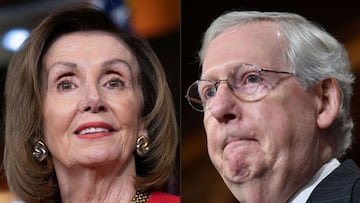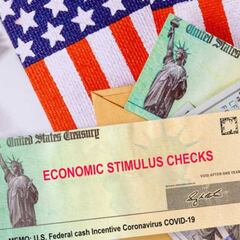Second stimulus check: which proposals have been unsuccessfully discussed?
Eight months after the CARES Act was signed, Nancy Pelosi and Mitch McConnell are still yet to agree on another covid-19 economic relief package.


The only major piece of financial support that has so far been passed by Congress is the CARES Act, the $2.2 trillion package that President Donald Trump signed into law back on 27 March 2020. However that was the peak of bipartisan consensus and since then lawmakers have failed to agree another deal to offer economic relief for those suffering.
The support offered by the CARES Act helped individuals, families and business to cope with loss of income but those provisions are gradually running out. The vast majority of the $1,200 stimulus checks were sent out months ago; the additional unemployment benefits were halved at the end of July, and they will run out entirely on 26 December.
12 million people will lose pandemic unemployment benefits the day after Christmas, says a new @TCFdotorg report. PUA (which supports freelancers) and PEUC (extended benefits) expire that day.
— AJ+ (@ajplus) November 18, 2020
The CARES Act itself expires Dec. 31, and Congress has yet to pass a new relief deal. pic.twitter.com/pEPLBtxRyB
There have been attempts to strike another deal but other issues have distracted from the task. The campaigning for the 2020 presidential election took up a lot of Trump’s time; stimulus package negotiations were cancelled so Amy Coney Barrett could be confirmed to the Supreme Court, and the chaotic election aftermath has taken up the last three weeks.
Despite that, offers have been tabled by both sides. Here’s what proposals have been made so far.
House Democrats pass the HEROES Act
Soon after the CARES Act was signed into law negotiations were already underway to secure a second major bill as the pandemic’s economic disruption spiralled. The Democrat-controlled House of Representatives passed the even larger HEROES Act on May 15, which including over $3 trillion worth of federal funding.
The bill was designed to supplement the CARES Act and provided additional safety net spending, which included unemployment benefits, job training for low-income individuals and an increase in aid to disabled veterans. Crucially, this bill also allowed for another $435 billion in rebates which would include another round of $1,200 stimulus checks.
Right now, Congress should come together and pass a COVID relief package like the HEROES Act that the House passed six months ago. Once we shut down the virus and deliver economic relief to workers and businesses, then we can build back better than ever before.
— Joe Biden (@JoeBiden) November 16, 2020
But despite comfortably passing the Democrat-led House it stood little chance of passing the Senate, where the Republicans hold a majority. The bill was revised in October when the $2.2 trillion HEROES Act 2.0 was passed through the House, but again faced pushback in the Senate. Majority Leader Mitch McConnell said of the proposal: “I don’t think the current situation demands a multi-trillion-dollar package.”
Senate Republicans propose “skinny” bill in return
Although they managed to come to an agreement pretty quickly in March, the two political parties are usually some distance apart when it comes to spending. The $3 trillion HEROES Act had no chance of passing the senate and, in return, McConnell tabled what he termed a “skinny” bill, costing around $500 billion. This package was put to a vote in September and October but despite passing the Senate, Speaker of the House Nancy Pelosi refused to vote on it.
One of the main sticking points was on the lack of stimulus checks in the Republican bill, which is thought to be a line in the sand for the Democrats. Without some form of direct cash injection it seems unlikely that the Democrats will go for any Republican proposal. Earlier this week, a group of 127 economic experts and scholars penned an open letter calling for another two rounds of $1,200 stimulus checks to help restart the economy.
"It is unconscionable to cut off money to the hardest hit." @Claudia_Sahm was one of 125 economists who signed our letter urging Congress to act to get stimulus checks in people's hands before the holidays. pic.twitter.com/IATfafQY7R
— Economic Security Project (@EconomicSecProj) November 23, 2020
The letter reads: “We urge policymakers to use all the tools at their disposal to revitalize the economy, including direct cash payments, which are one of the quickest, most equitable and most effective ways to get families and the economy back on track.”
Stimulus checks prove to be the main stumbling block in negotiation
The CARES Act was the largest economic package of its kind in American history, so it should be no surprise that agreeing another has proved difficult. The idea of sending out free money to Americans is a long way from traditional Republican policies and they are currently unwilling to agree to another wave of stimulus checks.
This Georgia poll worker who worked on #ElectionDay is volunteering again to work in January for the runoff elections.
— AJ+ (@ajplus) November 26, 2020
The runoff elections for two Georgia Senate seats will determine which party will hold the Senate majority. pic.twitter.com/oKpYEd1fiz
Related stories
That may partly be influenced by the situation in Georgia where two runoff elections will decide who controls the Upper House for the next two years. Both of the state’s Senate races were extremely close and triggered a runoff election to be held on 5 January. As it stands, the Democrats control the House and have just won the presidency so the Republicans will be desperate to cling on to the Senate.
If the Republicans were to lose both seats, and therefore control of the Senate, then they would have very little negotiating power in future discussions. With Senate only in session for another three weeks before the New Year, we may have to wait for the outcome of the Georgia races before a new stimulus package can be agreed.

